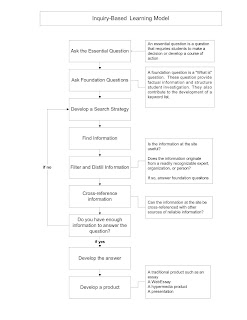I believe that being a reflective practitioner is an integral part of being a successful teacher. Upon the completion of my Information Learning Activity(ILA) I decided to use the Generic, Situated and Transformative(GeST) windows for information literacy (Lupton & Bruce, 2010) to analyse how well my ILA achieved ‘holistic information literacy education’ and to determine what changes I could make to improve my ILA for future use.
Information literacy can be viewed from 3 different perspectives: as a set of generic skills, as occurring in social practices, or as transformative- both for the individual and for society (Lupton & Bruce, 2010). Information literacy can involve various resources not just text. Resources and stimuli can be seen, heard and experienced through senses(Lupton & Bruce, 2010). For this reason, I decided to base my ILA in Science where students used many of their senses to gather and analyse information.
To begin with I analysed my ILA using the Generic window. This window views information literacy as a set of specific skills and processes that are used to find and work with information (Lupton and Bruce, 2010). The teaching and learning activities that fit here included lectures on using learning objects, drawing diagrams, the formatting of science experiments and critical reading of text. These tasks were geared to prepare students for future situations where they would be required to find information and use or display the information in a manner prescribed by their instructor.
Next I looked at my ILA through the Situated window. Through this window, literacy is viewed as, “contextual, authentic, collaborative and participatory,’ and ‘information is found through purposeful search strategies, but also by encountering information,”(Lupton & Bruce, 2010). Using one’s senses to gather information and build one’s understanding by working with information are vital, making the process more personal and subjective and in turn having an impact on social groups. Tasks that related to this contextualised information practice included hands on experiments, comic analysis (looking at contrasting perspectives of scientists) and class discussions about different ways we use electricity on a daily basis.
Finally, I used the Transformative window to view my ILA. I looked at ways students used information practices to change themselves and the society around them (Lupton & Bruce, 2010). I noticed that during the ILA we briefly discussed other sources of energy but students weren’t challenged to research further to determine what personal or political action they could take to improve the impact that our choices of energy consumption have on the environment. I have concluded that the transformative window was not really apparent in my activity. If students were challenged to take action, rather than just asked to explore in order to better understand how the world around them works, the ILA would be more socially critical as it would have included personal and political action and therefore address the theme of social responsibility(Lupton & Bruce, 2010).
In conclusion, I feel that my ILA included elements of the three GeST windows, but my primary focus was on the Generic and Situated windows. To improve the ILA for future teaching and learning episodes I would need to incorporate elements that would ‘empower learners to critique information in order to challenge the status quo and to transform oneself and society,’ (Lupton & Bruce, 2010). I plan to incorporate further analysis of other sources of energy and have students reflect on ways that they could make more environmentally friendly choices at home. I will also have students write to their local Member of Parliament suggesting ways in which schools could improve their consumption of energy in order to incorporate more sustainable practices for the future.
References:
Lupton, Mandy and Bruce, Christine. (2010). Chapter 1 : Windows on Information Literacy Worlds : Generic, Situated and Transformative Perspectives in Lloyd, Annemaree and Talja, Sanna, Practising information literacy : bringing theories of learning, practice and information literacy together, Wagga Wagga: Centre for Information Studies, pp.3-27.














